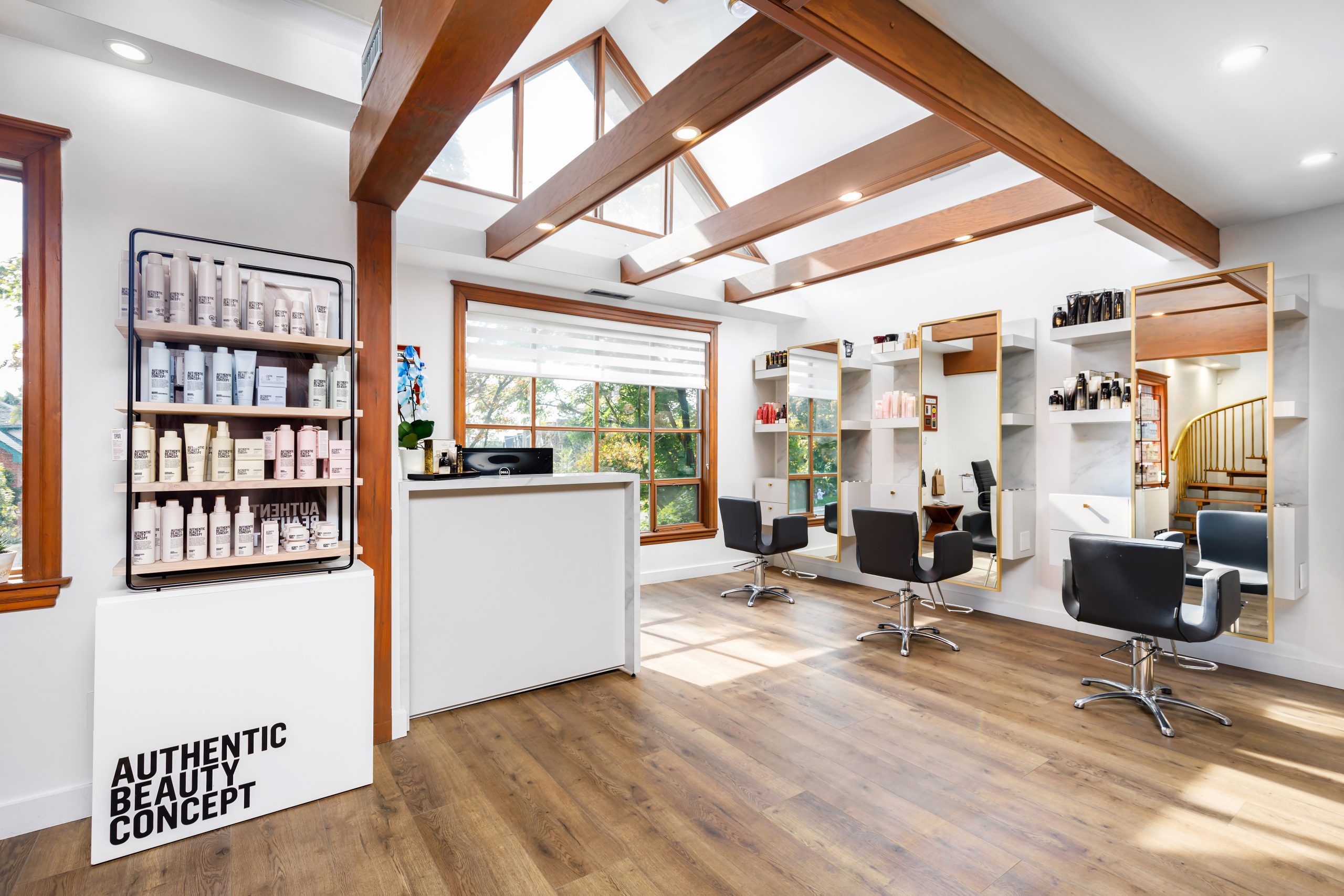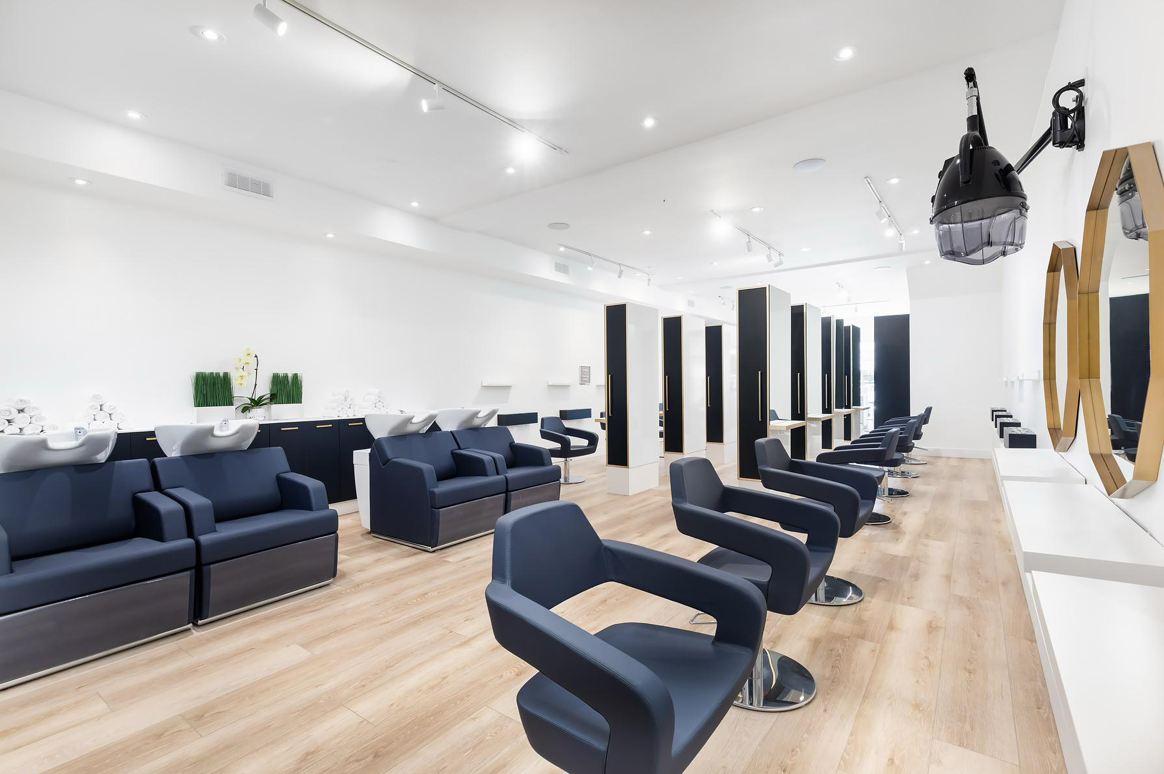Eco-Friendly Interior Design Ideas for Salons and Spas

Hair by Reema Salon design by Fiore Design Group
A green, energy-saving salon or spa is essential for its environmental benefits and long-term business success. Salons and spas are known for high energy and water consumption and waste production from hair clippings, disposable products, and packaging. A salon can significantly reduce its carbon footprint by switching to eco-friendly practices—such as energy-efficient lighting, water-saving fixtures, and sustainable product choices. Reducing energy use and waste helps lower greenhouse gas emissions, contributing to a healthier planet. These changes often result in substantial cost savings since efficient lighting, appliances, and heating and cooling systems help reduce utility bills over time. The financial benefits make green practices not only environmentally sound but economically wise.
Green practices also create a healthier environment for clients and staff. Eco-conscious salons often use products with fewer harsh chemicals, which improves indoor air quality and reduces exposure to potentially harmful substances. This can be especially important for stylists, who spend long hours in the salon. Additionally, as consumers grow more environmentally aware, many actively seek out businesses that align with their values. A salon that embraces sustainability can appeal to this growing demographic, building customer loyalty and enhancing its reputation as a forward-thinking, responsible business. In taking a leadership role, green salons also set an example within the industry, inspiring others to follow suit and creating a positive, collective impact on sustainability within the beauty sector.
Here are some key elements to consider when designing a green, eco-conscious salon:
Energy-Efficient Lighting and Appliances
Switching to energy-efficient lighting, such as LED bulbs, and investing in appliances with Energy Star ratings can significantly reduce a salon’s carbon footprint. LED lights consume about 80% less energy than traditional incandescent bulbs, last longer, and produce less heat, which is ideal for maintaining a comfortable salon atmosphere. Installing motion sensors or dimmers in low-traffic areas like storage rooms or bathrooms also helps save energy.

Eco-Friendly Salon Furniture and Decor
Sustainable furniture options include recycled, reclaimed, or renewable materials like bamboo, FSC-certified wood, or recycled metals. Look for upholstery made from organic, low-VOC (volatile organic compounds) materials that prevent harmful chemicals from releasing into the salon environment, helping to improve indoor air quality.
Water Conservation Strategies
Salons use a substantial amount of water, especially in wash stations. Implementing water-saving fixtures, such as low-flow faucets and showerheads, can reduce water consumption by up to 60%. Reusable towels and eco-friendly laundering practices, like cold water and eco-certified detergents, also contribute to water conservation.

Non-Toxic, Low-VOC Products and Materials
Many conventional salon products contain chemicals that harm the environment and can impact client and staff health. Opt for organic, cruelty-free, low-VOC products, including paints, finishes, and hair products. Many eco-friendly product lines also offer biodegradable or recyclable packaging, reducing plastic waste and removing harmful chemicals from the water supply.
Waste Management and Recycling Programs
Establishing a robust recycling program for paper, plastic, and metal can significantly impact. Salons produce various recyclable waste, from packaging to foil and plastic bottles. Some salons also incorporate compost bins for organic waste. Partnering with companies like Green Circle Salons, which specializes in recycling salon waste, can ensure proper disposal of materials like hair clippings, which can be repurposed for oil spill clean-up initiatives.
Educating Clients and Team Members on Sustainability
An eco-friendly salon can inspire clients and staff by sharing its commitment to sustainability. Create awareness through signage about recycling programs, eco-friendly products, and energy-saving practices used in the salon. This builds customer loyalty and motivates clients to adopt green practices at home.
By incorporating these elements, salons and spas can create a stylish, sustainable space that appeals to eco-conscious clients and contributes to environmental preservation. These strategies reduce a salon’s impact on the planet and build a brand reputation around responsibility and wellness—critical components of a successful, modern business. Creating an eco-friendly salon isn’t just a trend—it’s a commitment to sustainability and enhancing client loyalty while minimizing environmental impact.



